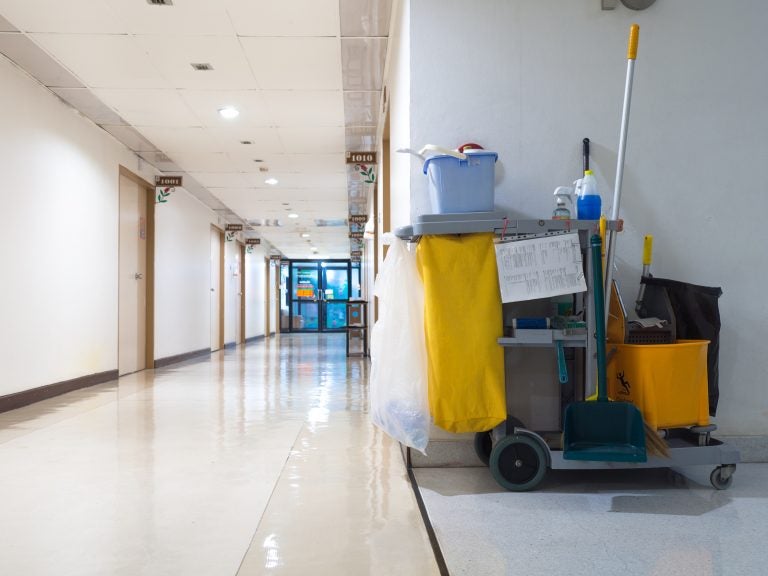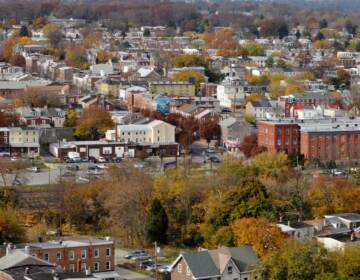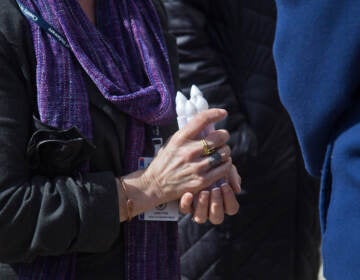Lost income for some, 12-hour days for others: How coronavirus response affects workers
Canceled events and empty rooms bring work to a hard stop at hotels and arenas. But a sudden demand for extra cleaning means long days elsewhere.

(The Pulse)
The spread of the coronavirus has led to a huge drop in business for hotels, canceled sporting events, and closed schools. That means no work and no income for some hourly workers.
Robyn Thornton has been a housekeeper for a large hotel in downtown Philadelphia for 5 ½ years. She would normally work nine hours a day on weekdays cleaning rooms, vacuuming, and changing bed sheets. She’s always been paid hourly.
At the start of this week, her hours went to zero.
“I was on for a couple days to work, then they called me, said ‘we’re going to change it,’ no work,” Thornton said. “I have a couple dollars saved up, but it’s still not enough … I still gotta pay rent, utilities. I still gotta make sure my son has food on the table, clothing on his back.”
She’s the sole source of income for herself and her 6-year-old son and has filed for unemployment. A lot of the housekeepers she works with are in the same situation, she said.
Thornton is a member of Unite Here, the union that represents many hotel, stadium, and airport workers in the Philadelphia region. Dermot Delude-Dix, a research analyst with the union, said the spread of the coronavirus means that thousands of its members here are out of work, and that many workers in other cities face similar problems.
“What we’re looking at right now is probably the biggest crisis for our industry since 9/11,” Delude-Dix said.
Kathy Hazel, who is also a Unite Here member, has worked for Aramark as a suite attendant at the Wells Fargo Center for 19 years.
“We went to work on Wednesday, not hearing anything was going to change for the NBA … and by the end of our shift, we were out of work,” she said. “That has a huge effect on everybody. You’re at work, and then you’re finding out at the end of the night you’re done.”
A lot of her colleagues live paycheck to paycheck, Hazel said, and were counting on the money from several days’ worth of events. Her husband still has his job, but their family now has to figure out how to pay her daughter’s college tuition, which is due soon.
She said she got an email from her manager saying that there will be no work for hourly employees such as herself till the end of March.
An Aramark representative said in an email Friday that company officials will follow the terms of the union’s agreement when it comes to pay and benefits, and that they “recognize the hardship that this unprecedented situation is causing for everyone and are actively working with our clients, government agencies and within our own policies to offer additional support for our hourly team members who are directly impacted.”
Not all service employees have lost work because of the virus. Some have actually been working more because buildings now need extra cleaning, said Gabe Morgan, vice president of Service Employees International Union (SEIU) Local 32BJ, which represents property service workers such as office cleaners, school custodians, and security guards.
In an interview Friday, Morgan said that of the union’s approximately 22,000 members in Pennsylvania, about 12,000 have been affected in some way by measures responding to the coronavirus.
“What that might mean is you’re at a university and you’re a cleaner and now you’re being asked to work 12-hour days,” Morgan said. “Or it might mean a security officer who normally doesn’t see a reduction in staff until the summer but all of a sudden it’s March and they’re shutting down the universities, or our members who clean public schools and are on pins and needles there trying to figure out exactly what the response is going to be in schools across the state.”
All this has happened in about four days, he said, and in his 10 years of organizing, he has never seen such sweeping changes at so many workplaces so quickly.
“By the end of next week, hopefully, there’ll be a much clearer sense about what all this means. I think that most employers don’t know what it means, everyone’s winging it right now.”
He also said in a statement that this pandemic “puts into stark relief our nation’s shameful lack of sick days, affordable health care and unions on the job. Far too many working people across the country do not have paid sick leave and must forfeit wages in order to take time off.”
 WHYY is one of over 20 news organizations producing Broke in Philly, a collaborative reporting project on solutions to poverty and the city’s push towards economic justice. Follow us at @BrokeInPhilly.
WHYY is one of over 20 news organizations producing Broke in Philly, a collaborative reporting project on solutions to poverty and the city’s push towards economic justice. Follow us at @BrokeInPhilly.
WHYY is your source for fact-based, in-depth journalism and information. As a nonprofit organization, we rely on financial support from readers like you. Please give today.



![CoronavirusPandemic_1024x512[1]](https://whyy.org/wp-content/uploads/2020/03/CoronavirusPandemic_1024x5121-300x150.jpg)


